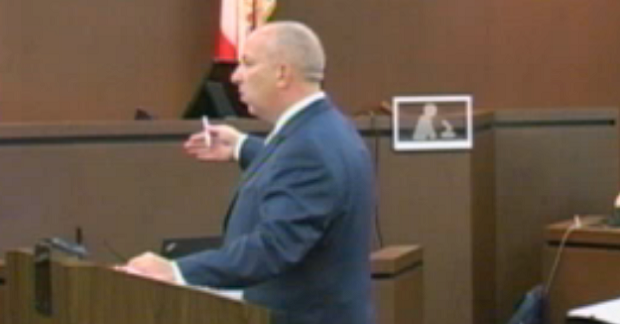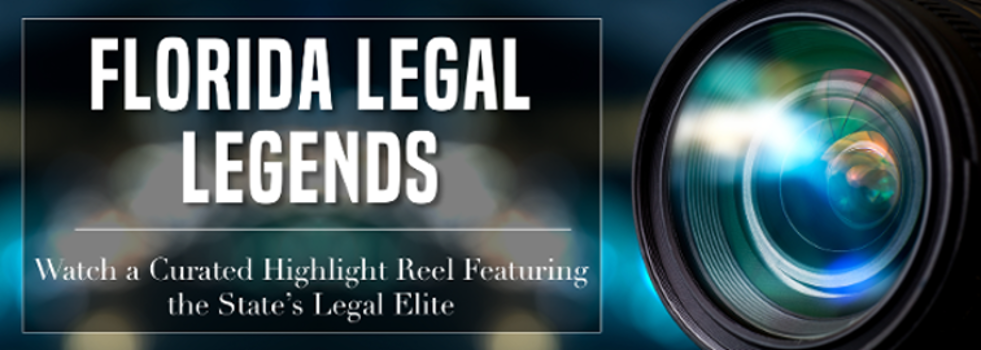
Gary Paige delivers his closing argument on behalf of Jo Freeman in trial against Philip Morris.
Gainesville, FL—After one juror rejected a purported verdict and the jury later announced themselves hopelessly deadlocked on damage questions, a state court judge Thursday declared a mistrial over Philip Morris’ alleged role in the cancer death of a Florida smoker. Freeman v. Philip Morris, 2015CA003930.
Eighth Circuit Judge Toby Monaco granted Philip Morris’ motion for a mistrial after jurors indicated they could not reach a consensus on whether the cigarette company should be liable for punitive damages in the cancer death of David Freeman, a long-time smoker of the company’s Benson & Hedges cigarettes. Jurors had also indicated during questioning that their professed $3 million compensatory award was an attempt at a compromise with regard to punitive damages.
Attorneys for Freeman’s wife, Jo, argued the court should accept a partial verdict, against Philipo Morris on the issue of liability, and declare a mistrial only as to damages. However, Judge Monaco rejected the argument. "Given that the jury is not even unanimous with respect to the compensatory damages amount, I'm going to grant the motion for a mistrial,” Judge Monaco said. “I can’t separate those from the liability issues. I think that’s pretty plain in Florida law that that can’t be done.”
Freeman, 54, died in 1995 of lung cancer that metastasized to his brain. His wife, Jo, claims his cancer was caused by her husband’s decades-long addiction to cigarettes and Philip Morris' participation in a scheme to hide the dangers of smoking.
The mistrial declaration ultimately came about two hours after jurors had returned to the court room with an ostensible verdict that was rejected by one of its members during polling. Judge Monaco sent the jury back to deliberate after delivering an Allen charge.
However, the jury was ultimately unable to reach a consensus.
During Wednesday’s closing arguments, Jo Freeman’s attorney, Gordon & Doner’s Gary Paige, requested up to $10.8 million in compensatory damages, plus a finding that punitives were warranted.
The case is one of thousands of Florida’s Engle progeny lawsuits against the nation’s tobacco companies. They stem from a 2006 Florida Supreme Court decision decertifying Engle v. Liggett Group Inc., a class-action tobacco suit originally filed in 1994. Although the state’s supreme court ruled that Engle-progeny cases must be tried individually, it found plaintiffs could rely on certain jury findings in the original case, including the determination that tobacco companies had placed a dangerous, addictive product on the market and had conspired to hide the dangers of smoking through much of the 20th century.
In order to prevail and be entitled to those findings, however, each plaintiff must prove class membership by showing nicotine addiction caused a smoking-related disease such as lung cancer.
Testimony in the eight-day trial focused on when Freeman knew of smoking’s dangers and whether he was addicted to cigarettes or simply chose to smoke. Jo Freeman’s attorneys had contended Freeman began smoking at about 15, the target of a tobacco marketing campaign with an eye toward teenage smokers that dovetailed with a scheme to cast doubt on evidence surrounding smoking’s dangers. They argued that, by the time he knew smoking was dangerous, he was so addicted to nicotine he failed in several quit attempts before his first cancer diagnosis in 1990 drove him to stop smoking for good.
In Wednesday’s closings, Jo Freeman’s attorney, Gordon & Doner’s Gary Paige told jurors Freeman’s heavy smoking and multiple failed quit attempts before finally succeeding just a few years before his death ultimately proved his addiction. “If someone was smoking 2-3 packs a day for 30 years [as Freeman did] for 30 years, common sense would say he’s addicted to nicotine,” Paige said.
However, the defense argued pointed to periods Freeman didn’t smoke for days or weeks while hospitalized or during quit attempts, as well as his lack of apparent nicotine withdrawal side effects, as evidence he wasn’t addicted. “Why did he smoke, truly? He liked it, like lots of smokers. He enjoyed it. That is the only testimony in this case, why he smoked, from plaintiff, just that he enjoyed it,” Sastre said.
Email Arlin Crisco at acrisco@cvn.com.
Related information
Jo Freeman is represented by Dolan, Dobrinsky & Rosenblum’s Randy Rosenblum, Gordon & Doner’s Gary Paige, and Wilner Hartley & Metcalf’s Richard Lantinberg.
Philip Morris is represented by Joseph Fasi, of Gass Weber Mullins and Shook Hardy’s Hildy Sastre.
Not a subscriber?
Learn about CVN's unrivaled library of gavel-to-gavel trial video live and on demand.





